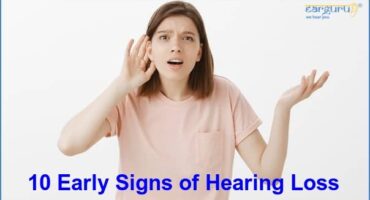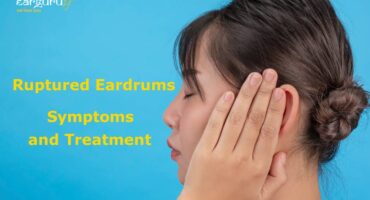Presbycusis, also known as age-related hearing loss, is a common condition that affects elders. Presbycusis is a gradual decline in hearing ability and can have a significant impact on an individual’s quality of life. In this blog, we will explore the causes, symptoms, and the various treatment options available to help individuals manage their hearing loss and improve their overall quality of life.
Table of Contents
What Is Presbycusis?
Hearing loss related to normal aging is known as presbycusis. It is defined as the loss of hearing in old age. In most cases, presbycusis hearing loss is symmetrical or in both ears. The presbycusis definition or the literal meaning of the Greek word presbycusis is age-related hearing loss.
What Causes Presbycusis or Age-Related Hearing Loss?
The following are some of the causes of presbycusis:
- Natural changes or reduction in sensitivity or performance, of our inner ear.
- Age-related degeneration of nerves from the ear to the brain.
- Hereditary factors
Other factors that can hasten the onset of presbycusis are:
- Continuous exposure to loud sounds (music or noise pollution)
- Health conditions like diabetes, high blood pressure, and heart diseases.
- Ototoxicity or side effects of certain medicines.

At What Age Does Hearing Loss Begin?
Presbycusis is a common age-related hearing loss. 1 in 4 people experience hearing loss from the age of 45 years onwards, and the possibility of presbycusis increases with age. The table below shows the age and the percentage of people suffering from hearing loss.
| AGE | PREVALENCE |
| 45 – 54 | 25% |
| 55 – 64 | 50% |
| 65 – above | 75% |
It is worth noting that the prevalence of presbycusis may vary depending on the population being studied and the methods used to assess hearing loss.
What Are Some of The Common Symptoms of Presbycusis?
Some of the common presbycusis symptoms are:
- Unable to hear the doorbell or the ring of the telephone.
- Missing out on words in a telephone conversation.
- Difficulty in following conversations with children and ladies as compared to males. Presbycusis is mostly a high frequency hearing loss.
- Difficulty in following the conversation, especially if the person talking is behind you or some distance away.
- Unable to fully understand while in a group discussion, like an office meeting or a family get-together.
- Inability in following the conversation if the conversation is in a noisy area, like a restaurant or a public place.
- You can hear the words but are unable to understand or the words are not clear.
- Unable to locate the source of sound if someone calls out.
- Missing out every day sounds like the clock ticking, AC humming, water running, or birds chirping.
- You keep increasing the volume of the television or the radio. The loud volume may be unbearable to the other family members.
- A person in the initial stages of presbycusis will complain about others not speaking loud enough or clearly.
- Requesting others to repeat themselves.
- Gradually withdrawing themselves from family discussions and social events as a conversation with acquaintances is embarrassing.
- Showing signs of tiredness after a discussion as you have to strain yourself to hear, this causes additional stress.
How Is Presbycusis Diagnosed?
Presbycusis diagnosis starts with the patient’s medical history followed by the physical examination of the ear. The ENT doctor will look into the ear with the help of an otoscope to check for infection, inflammation, earwax accumulation, or any sign of physical damage.

If the hearing loss is not due to any of the above reasons, the doctor will recommend a few other tests to confirm presbycusis hearing loss.
The presbycusis tests are:
• Hearing Screening
• Pure-Tone Audiometry
• Speech Audiometry Test
• Hearing In Noise Test (HINT)
Is Presbycusis Conductive or Sensorineural Hearing Loss?
Presbycusis is a sensorineural hearing loss since it affects the cochlea, the hair cells, and to some extent the neural pathways. Age-related hearing loss is mostly due to the inner ear and not due to the outer ear or the middle ear. Hearing loss caused by problems in the outer ear and the middle ear is classified as conductive hearing loss.
Read more about causes and remedies for sensorineural hearing loss and conductive hearing loss.
What Are the Types of Presbycusis?
There are 4 main types of presbycusis:
1. Sensory Presbycusis
Involving damage to sensory hair cells and supporting cells.
2. Neural Presbycusis
Caused by the damage to nerve cells in the cochlea and auditory pathways to the brain.
3. Metabolic Presbycusis
Due to the damage to the stria vascularis. The stria vascularis regulates the chemical and bioelectrical balance and metabolic health of the cochlea.
4. Mechanical Presbycusis
Caused by degenerative thickening and stiffening of the basilar membrane of the cochlea.
How To Treat Presbycusis?
Since presbycusis is a sensorineural hearing loss, there is no presbycusis treatment. Presbycusis cannot be cured but presbycusis management can improve communication and the quality of life.
The common remedies for presbycusis or age-related hearing loss are:
- Hearing aids
- Cochlear Implants
- Assistive listening devices
- Lip-reading
How To Prevent Hearing Loss in Old Age?
Hearing loss in old age cannot be prevented as it is age-related. Like the other parts and organs of the body, natural aging or wear and tear of the organs takes place. But precautions can be taken to delay the onset or progression of hearing loss.
Some of the ways to prevent hearing loss in old age are:
- Protect your ears from loud music and noise. Use earplugs if you are working in a factory or a construction site. Read our article for tips on protecting your hearing.
- Avoid self-medication, do not consume medicines without consulting the doctor. Some medicines cause ototoxicity that permanently damages the delicate hair cells in the inner ear.
- Take care of your health, diseases like diabetes, high blood pressure, and heart problems are causes of hearing loss. Read our article on diseases that cause hearing loss.
- Treat ear infections. Though mild cases of infection heal on their own, consult a doctor if the infection persists.
- Avoid smoking and drinking in excess. Many every day habits can cause hearing loss. read our article on habits that can cause hearing loss.
Tips For Presbycusis Management
Do not hide your hearing loss, there is nothing embarrassing about deafness. Approximately, 30% of the people in the age group of 56 to 74 years and almost half of the people over 75 years suffer from age-related hearing loss.
Follow these presbycusis management tips for better communication.
- Do not hesitate to tell your relatives and friends about your hearing loss. They will help you deal with situations.
- Request people to speak a little louder.
- Request the people to face you while talking. Lip reading and facial expressions will assist you to understand the conversation better.
- If at a restaurant, select a table away from the kitchen or a noisy counter.
- Use audio streaming devices or Bluetooth-enabled devices to watch TV or listen to music.
- Use hearing aids or other assistive listening devices to aid your hearing.
Using hearing aids is very important, neglecting hearing loss can lead to age-related hearing loss dementia and depression. Read our article on the advantages of hearing aids for elders
References:




Explore Audiology CME Conferences, Meetings, and Online CME Courses. Register for upcoming 2023 Audiology Conferences & earn CME Credits